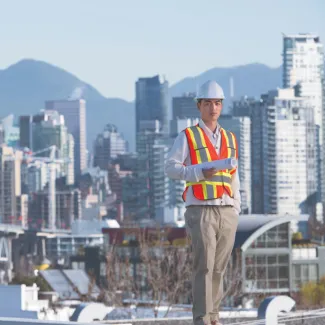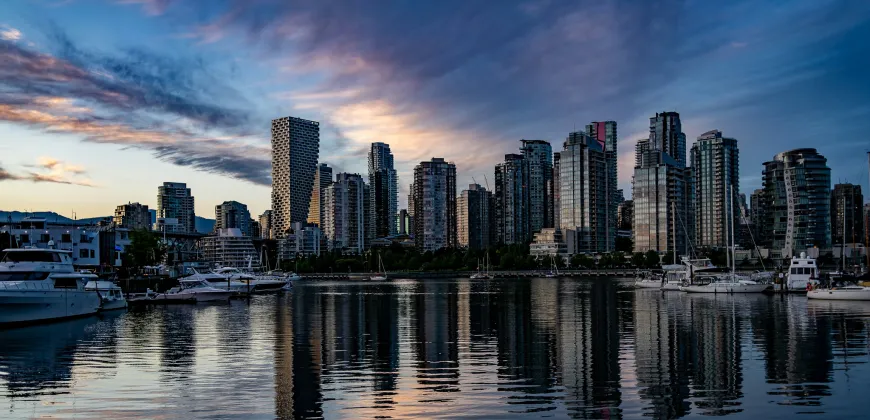Holistic education blends urban planning and urban engineering

If you want to pursue a career in urban planning or urban infrastructure, the MEL in Urban Systems offers students with both engineering and non-engineering backgrounds a clear path to leadership positions within the industry.
“Our students are diverse in professional backgrounds and where they have worked,” says Program Co-Director Amy Kim, who is a Professor of Civil Engineering at UBC.
She notes that the program attracts domestic and international students who come to the program with a range of academic and professional backgrounds in areas that include engineering, urban planning, architecture and landscape architecture, and geography, among other disciplines.
“What they share is a common interest in urban infrastructure and sustainability and the desire to be leaders within that space in their professional careers,” she says.
Amy explains that the program offers important opportunities for students to gain new knowledge and skills that complement their existing strengths.
“If you have an engineering background, the MEL in Urban Systems offers a broad perspective on infrastructure that goes beyond the technical aspects engineers tend to focus on,” she says. “Your perspective is going to be enriched by the planning courses and learning alongside members of the cohort with non-engineering backgrounds.”
The program is equally valuable for those with non-engineering backgrounds. “If you have a background in planning or another related field, this program will offer you exposure to project delivery and management, as well as some of the engineering aspects of civil infrastructure,” says Amy.
The diversity of the student cohort and instructors creates a powerful learning environment.
“When we’re talking about concepts like infrastructure, sustainability and resilience, your perspective is going to be enriched by the fact that someone else in your cohort is coming at this from a totally different professional viewpoint and background,” she says.
Amy notes that these diverse perspectives are crucial for people working in city planning and infrastructure.
“The challenges we’re facing in our urban built environments go far beyond the narrow scope of traditional disciplines. A program like the MEL in Urban Systems enables you to round out your education and gain a deeper understanding of the systems that underpin our urban areas.”
From Systems to Cities: Building a Broader Perspective
Saarah Arkoulis came to the MEL in Urban Systems with a diploma in mechanical engineering and a bachelor’s degree in construction management. She began her career focused on mechanical systems – just one component of how buildings come together – but quickly realized she wanted a broader understanding of the full building process. Her construction management degree opened the door to hands-on construction project work, stakeholder coordination, permitting, and planning etc. enabling her to move into increasingly senior project roles.
“I was slowly advancing in my career, but I didn’t want to be limited by a lack of formal education,” she says. “Rather than specializing further, I wanted to broaden my perspective and gain a deeper understanding of how infrastructure systems work at a city-wide level. The MEL in Urban Systems offered the opportunity to combine planning, infrastructure and business – all the tools needed to lead in the public sector.”
Before starting the MEL, Saarah had just begun a new leadership role as Manager of Capital Projects, Real Estate and Strategic Planning at Fraser Health Authority, where she led complex capital initiatives across the region. The MEL allowed her to step back and refine her understanding of how large-scale systems are planned, delivered and managed across the full asset lifecycle.
“The MEL program offered an opportunity to expand my knowledge beyond how buildings come together to the infrastructure systems that are required to make a city function and prosper,” she says. “It also opened doors to roles beyond manager positions – into director or executive-level opportunities that require not just experience, but the education to lead in the public sector.”
Since graduating in 2023, Saarah joined the City of Coquitlam as Manager of Capital Projects. She is currently leading one of the City’s largest civic investments to date—the new Burke Mountain Community Centre, set to open in 2029—alongside the adjacent Burke Village Park. In addition to these major initiatives, she oversees a portfolio of smaller capital projects and supports process improvements across the division.
“The Urban Systems MEL courses provided valuable insights into different project delivery models and the phases of a project from initiation to closeout,” she says.
“Courses in asset management deepened my understanding of the full life cycle of an asset – including natural assets – and emphasized the importance of tracking asset condition to avoid long-term impacts on the community. The opportunity to take electives from other UBC programs, including community planning, strengthened my skills in report writing and enhanced my confidence in delivering oral presentations to City Council.”
Gaining new perspectives on city systems
Ray Pang had a professionally diverse career in landscape architecture in China and chose the MEL in Urban Systems to gain new knowledge of the broader context of city planning and urban engineering.
He cites the course in urban systems engineering for enabling him to grow his knowledge of the technical infrastructure systems within urban environments, including water distribution, solid and liquid waste treatment, stormwater management, transportation and energy. Field trips to local landfill and water treatment facilities – as well as frequent guest lecturers – made the technical content engaging and relevant.
Ray also notes that a course on project delivery and economics introduced him to new concepts, and that he now has a deeper understanding of different procurement models and how they relate to decision-making. He’s also more confident in financial modelling, understanding public versus private perspectives, market realities, policy conflicts, opportunities for innovation, future projections, cash flow and risk management.
After completing the program in December 2024, Ray was hired as a landscape designer for space2place as a landscape designer. He’s part of a team working on the Iona Island Wastewater Treatment Plant to come up with plans and designs for restoring ecological processes, flood protection strategies and plant phasing plans extending through 2100.
The holistic education needed to tackle complex challenges
Peter Sun had an academic background in architectural science and work experience as a project manager in real estate development. “I realized that my initial goal of wanting to improve quality of life through architecture and community development could be achieved by pursuing additional education in urban planning,” he says.
For him, the MEL in Urban Systems had benefits over a traditional master’s degree in planning, because it integrated a wide range of disciplines, including planning, engineering and business.
“The urban systems courses focus on systems thinking rather than in-depth engineering calculations,” he says. “That systems thinking approach was complemented by the Sauder business courses, where you gain understanding of strategy and decision making, learning how to influence and inspire organizations to take action.”
After graduating in 2021, Peter worked for the Vancouver Economic Commission as a green building sector lead. “I was able to apply my knowledge of architecture, real estate development, systems-level urban planning and an understanding of how policies affect the business market,” he says.
Now the Project Manager of Market Transformation at the Zero Emissions Innovation Centre, Peter engages with industry partner stakeholders and identifies strategies to support the local economy to make it more sustainable and resilient. He also manages an innovation fund to support building electrification projects, and was responsible for revamping the intake process and evaluating proposed projects.
“As a student, it’s useful to be learning alongside people with diverse professional backgrounds,” says Peter. “This program also helps you build local connections – and I do think that the MEL is showing up a lot and is highly regarded in the industry.”
Program benefits people with diverse backgrounds
The experience of alumni like Saarah, Ray and Peter is representative of the career trajectories of other alumni from the MEL in Urban Systems.
As Program Co-Director Amy Kim says, “we bring together the mix of people, courses and instructors to support students to be leaders.”



